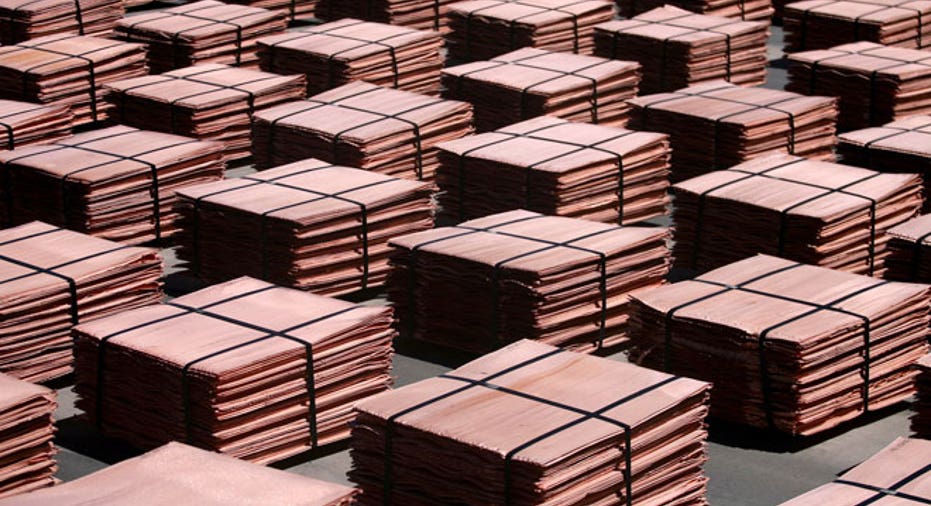Copper Spirals Down For 4th Day Because Of China Fears

Copper spiralled lower for a fourth straight session on Wednesday, sinking to fresh 44-month lows on persistent worries about the potential for credit problems in China to unleash metal from inventories.
The metal is often referred to as "Dr. Copper" for its reputed ability to reflect the world's economic health, since it has broad industrial uses ranging from construction to electricity supply to automobiles.
European industrial consumers have been bargain hunting but analysts say prices may slide further before heavy buying kicks in from consumers in China, which accounts for 40 percent of global demand.
Copper on the London Metal Exchange, the most widely followed metal among investors, slid to a session low of $6,376.25 a tonne, its weakest since July 2010, before recovering to $6,428 by 1120 GMT, down 0.7 percent.
Most other base metals were caught in the downdraft, but nickel bucked the weaker trend and added 0.5 percent to $15,628 a tonne, extending its recent rally fuelled by concern about an Indonesian ban on unprocessed ore.
Three-month LME copper has shed nearly 9 percent since Thursday, including 2.6 percent on Tuesday, and the free-fall was having knock-on effects on other markets.
Stocks across Asia fell while the Australian dollar, Chilean peso and South Africa's rand, currencies highly sensitive to commodities, all buckled.
Fears continued to percolate among investors that moves by China to deregulate its economy would mean a halt to a thriving trade of importing copper to lock in financing for other sectors such as real estate.
A bond default by a Chinese solar panel company last week ignited worries about risk in the country's credit market and sent a strong signal that the government was committed to reform.
"As you get on the one hand a freeing up of the official channels through the deregulation of the market, you also get a drying up and clamping down on those unofficial shadow banking channels," said Nic Brown, head of commodities research at French bank Natixis.
Over the past five or six months, copper inventories in Shanghai bonded warehouses are estimated to have more than doubled to 750,000-800,000 tonnes from 350,000, Brown added.
A good deal of copper held in China's bonded zones is tied up in financing deals where importers buy copper to raise credit for more lucrative investments elsewhere, and investors fear liquidation of those deals could swamp the market.
But recent selling appeared to be driven more by sentiment than a reflection of the actual market in China, traders said, with demand weaker than usual but still reasonable, while the strongest quarter for consumption is about to get underway.
"People are afraid of a knock-on effect to commodities - it's a reflection of how bad sentiment towards China is," said analyst Sijin Cheng of Barclays in Singapore.
"But if you're actually talking about facts, or what people are seeing right now, it doesn't point to any unravelling of financing deals," she said.
The most-traded June copper contract on the Shanghai Futures Exchange tumbled by 5 percent to 43,740 yuan ($7,100) a tonne, its lowest since July 2009 before paring loses to 44,600 a tonne the end of the second trading session, still down 3.2 percent on the day.
BUYING KICKS IN
One European trader said there was extensive hedging by consumers in Europe due to the weak LME prices combined with a strong euro. "It's just too attractive to pass up," he said.
Three-month LME copper could go as low as $6,000 a tonne as speculators seek to profit further, but it is unlikely to break below that level, Brown said.
"Bear in mind that China still needs to import copper. If spot prices continue to fall, there would come a point where Chinese consumers decided this was just too attractive to pass up," he said.
Reflecting a slowdown in physical sales, premiums for bonded copper in Shanghai steadied for a second day at $120-$150 a tonne on Wednesday, having tumbled $15 earlier in the week, according to China price provider Shmet. (http://www.shmet.com/)
Still, traders said they were confident that Beijing would step in to settle markets before they became disorderly.
"I don't personally think it's that bad in China. This is opportunistic selling," one trader in China said.



















